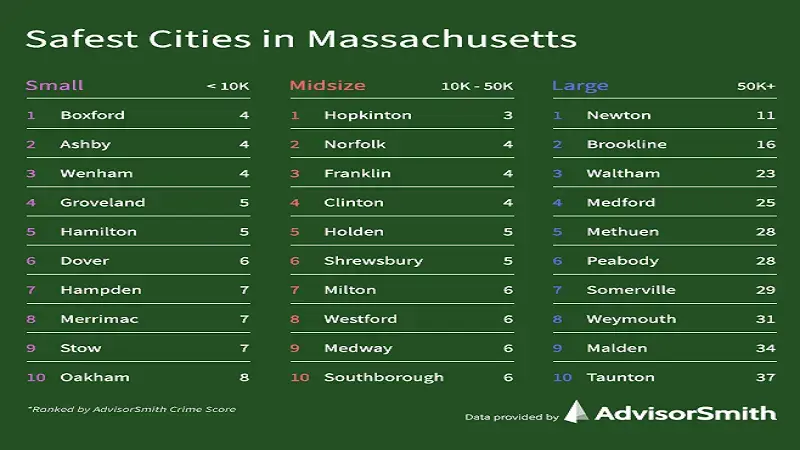Second Chance Housing is an innovative approach aimed at reducing recidivism rates and providing individuals with the opportunity to rebuild their lives after involvement in the criminal justice system. In Massachusetts, where the need for effective reintegration programs is crucial, Second Chance initiatives have gained significant attention. By providing stable housing options, support services, and access to resources, these programs seek to break the cycle of incarceration and promote successful community reintegration. Here, we will examine the importance of second-chance housing in Massachusetts, the challenges faced in its implementation, and reentry programs. Let’s dive right into it.
Second Chance Housing In Massachusetts

Second Chance Housing is not just about giving someone a roof over their head; it’s about providing individuals with an opportunity to rebuild their lives after involvement in the criminal justice system. It offers a fresh start and a chance to reintegrate into society.
Recidivism, the tendency for someone to re-offend after being released from prison, is a major challenge in our society. Second Chance Housing plays a crucial role in addressing this issue by providing stable housing and support services, which are essential factors in reducing the likelihood of individuals returning to a life of crime.
Importance Of Second Chance Housing
Second-chance housing plays a crucial role in the state. It provides individuals with a fresh start and an opportunity to rebuild their lives. This type of housing is significant for those who have faced challenges such as homelessness, substance abuse, or incarceration. By offering stable housing and support services, second-chance housing helps individuals reintegrate into society and reduces the likelihood of recidivism. It is an essential component of Massachusetts’ efforts to promote rehabilitation and create a more inclusive and equitable community.
Investing in Second Chance Housing makes economic sense too. By reducing recidivism rates, Massachusetts can save taxpayer dollars that would otherwise be spent on incarceration and criminal justice costs. Moreover, individuals who reintegrate successfully into society through Second Chance Housing are more likely to become taxpayers, contributing to the local economy.
Legal And Regulatory Hurdles
Implementing Second Chance Housing programs often requires overcoming legal and regulatory obstacles. Zoning restrictions, licensing requirements, and certain leasing practices can pose challenges in providing adequate housing options to individuals with criminal records. Advocacy for policy changes and collaboration with local authorities are necessary to address these hurdles effectively.
Also, check out:
- Apartments That Accept Felons In Connecticut
- HUD And FHA Homes
- Best Delivery Jobs For Felons
- Anatomy Of A Felony Trial
Funding Limitations And Financial Challenges
Securing funding for Second Chance Housing programs can be a constant struggle. Limited resources and competing priorities can hinder the expansion and sustainability of these initiatives. Innovative funding models, public-private partnerships, and increased government support are crucial to overcoming financial barriers and ensuring the availability of affordable housing for those seeking a second chance.
Public Perception And Community Resistance
Negative public perception and community resistance can impede the implementation of Second Chance Housing initiatives. Misconceptions about public safety and stereotypes associated with formerly incarcerated individuals can deter community acceptance. Education, awareness campaigns, and fostering dialogue between stakeholders are vital in dispelling myths and promoting the understanding that Second Chance Housing benefits not only individuals but also the entire community.
Legislative Reforms And Policy Changes
To further expand Second-Chance apartments in Massachusetts, it is crucial to advocate for legislative reforms and policy changes. One recommendation is to revise regulations that restrict individuals with criminal records from accessing public housing. Implementing fairer policies that consider an individual’s rehabilitation and current circumstances can create more opportunities for those seeking a fresh start.
Financial Incentives And Resources For Implementing Second Chance Housing
To effectively implement Second Chance Housing initiatives, it is essential to provide financial incentives and resources. This can include grants or tax incentives for landlords who are willing to rent to individuals with criminal records. Additionally, investing in supportive services such as job training programs and counseling can greatly enhance the success and stability of individuals transitioning from incarceration to housing.
Impact Of Second-Chance Apartment On Recidivism Rates In Massachusetts
Second-chance housing programs aim to reintegrate individuals with a criminal record back into society by providing stable housing and support services. By addressing one of the major barriers faced by formerly incarcerated individuals – housing instability – second-chance housing programs have the potential to reduce recidivism rates.
1. Stable Housing
Research has consistently shown that stable housing is a crucial factor in preventing recidivism. Second-chance housing programs provide individuals with a safe and secure place to live, reducing their exposure to high-risk environments associated with criminal activities. By providing stable housing, these programs help individuals avoid returning to their old neighborhoods or living situations that may have contributed to their criminal behavior.
2. Access to Support Services
Second-chance housing programs often provide additional support services such as employment assistance, substance abuse counseling, mental health support, and life skills training. These comprehensive services address the underlying issues that may have led to criminal behavior in the first place. By providing access to these resources, second-chance housing programs help individuals develop the skills and support networks necessary for successful reintegration.
3. Reduced Homelessness
Homelessness is a significant risk factor for criminal behavior. By providing housing to formerly incarcerated individuals, second-chance housing programs help reduce homelessness rates among this population. Stable housing reduces the need for individuals to engage in illegal activities to meet their basic needs. By addressing homelessness, second-chance housing programs contribute to a lower risk of reoffending.
4. Community Engagement
Second-chance housing programs often promote community engagement and encourage individuals to become active participants in their neighborhoods. By fostering a sense of belonging, these programs help individuals build positive relationships, develop social skills, and establish pro-social connections. This engagement can act as a protective factor against reoffending and help individuals reintegrate successfully into society.
However, it is important to note that the impact of second-chance housing on recidivism rates can vary depending on various factors such as the quality of support services provided, the level of community acceptance, and individual factors such as the severity of the criminal history and personal motivation for change. Additionally, recidivism rates are influenced by various complex factors beyond housing, including education, employment, family support, and access to healthcare. Therefore, second-chance housing programs should be part of a comprehensive reintegration strategy that addresses these multiple factors to maximize their effectiveness in reducing recidivism.
The Role Of Community Organizations In Supporting Second Chance Housing
Community organizations play a crucial role in supporting Second Chance Housing initiatives. They can provide resources, advocacy, and assistance to individuals seeking housing opportunities. Collaborating with these organizations can help create a network of support, ensuring that individuals transitioning from incarceration have the necessary tools to succeed.
Educating The Public And Dispelling Misconceptions About Second Chance Housing
To foster community support, it is important to educate the public about Second Chance Housing and dispel misconceptions. By raising awareness and addressing concerns, we can help diminish the stigma and biases surrounding individuals with criminal records. Public education campaigns can emphasize the benefits of Second Chance Housing for both individuals and the community as a whole.
Safe And Budget-friendly Places To Live In Massachusetts

1. Worcester
Known as the “Heart of the Commonwealth,” Worcester is a vibrant city with affordable housing options and a lower cost of living compared to other cities in Massachusetts. It offers a range of amenities, a strong job market, and is well-connected by public transportation.
2. Lowell
Located in the Merrimack Valley, Lowell is a historic city that offers a mix of urban and suburban living. It has a reasonable cost of living, affordable housing options, and a strong community feel. Lowell also has excellent schools and is known for its diverse cultural scene.
3. Springfield
Situated in western Massachusetts, Springfield offers affordable housing, relatively low crime rates, and a variety of amenities. It has a rich history and culture, including the Basketball Hall of Fame, and is known for its beautiful parks.
4. Pittsfield
Located in the Berkshires region, Pittsfield offers stunning natural beauty and a lower cost of living compared to other parts of Massachusetts. It has a strong arts scene, numerous outdoor recreational opportunities, and a tight-knit community.
5. New Bedford
Located on the south coast of Massachusetts, New Bedford is a city with a maritime heritage, charming historic architecture, and affordable housing options. It has a growing arts scene, and beautiful beaches, and is known for its fishing industry.
6. Fitchburg
Situated in north-central Massachusetts, Fitchburg offers a lower cost of living, affordable housing, and a close-knit community. It has a small-town feel, with access to outdoor activities and nearby state parks.
7. Boston
Boston, the capital of Massachusetts is home to the oldest public park in the United States, the Boston Common. It was established in 1634 and is still a popular gathering place and recreational area for both locals and tourists today.
Remember, while these places are generally considered safe and budget-friendly. It’s essential to research specific neighborhoods and consider your personal preferences, job prospects, and lifestyle when choosing a place to live.
The Importance Of Continued Advocacy And Support For Second Chance Housing
The future of Second Chance cribs in Massachusetts holds promising prospects for expansion and improvement. By building on the existing initiatives and implementing the recommended policy changes, we can extend the reach of Second Chance Housing to more individuals who deserve a chance to rebuild their lives.
However, Continued advocacy and support are crucial for the success and sustainability of Second Chance Housing. Individuals, community organizations, and policymakers need to remain committed to providing opportunities for rehabilitation and reintegration. Through collective efforts, we can create a brighter future for individuals seeking a second chance in Massachusetts.
Exploring Existing Programs And Their Approaches
Massachusetts is home to notable Second-Chance programs that have made a significant impact. These programs provide not only housing but also support services such as job training, counseling, and community integration assistance. By taking a comprehensive approach, these initiatives have fostered successful reentry and reduced recidivism rates.
Also, Massachusetts is inspiring. A lot of housing programs have helped individuals secure stable housing, find meaningful employment, and reunite with their families. By focusing on individualized support and fostering a sense of community, these programs have proven that everyone deserves a second chance and that with the right opportunities, individuals can thrive and contribute positively to society.
Conclusion
As Massachusetts continues to grapple with high recidivism rates and the challenges faced by individuals reentering society after incarceration, Second-Chance programs offer a promising solution. By providing stable housing and comprehensive support, these initiatives have the potential to transform lives, reduce crime, and strengthen communities. However, to fully realize the benefits of Second-Chance Housing, it is crucial to address the barriers and challenges that hinder its implementation, such as legal and financial constraints. With continued advocacy, policy reforms, and community engagement, the future of Second-Chance apartments in Massachusetts holds great promise, offering individuals a genuine second chance and the opportunity for a brighter, more productive future.